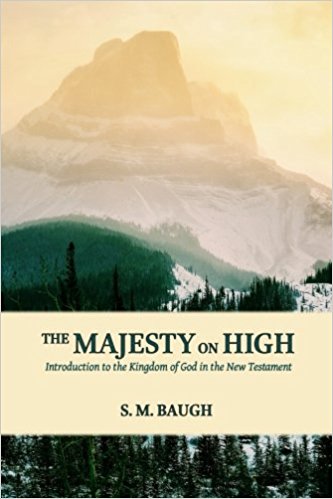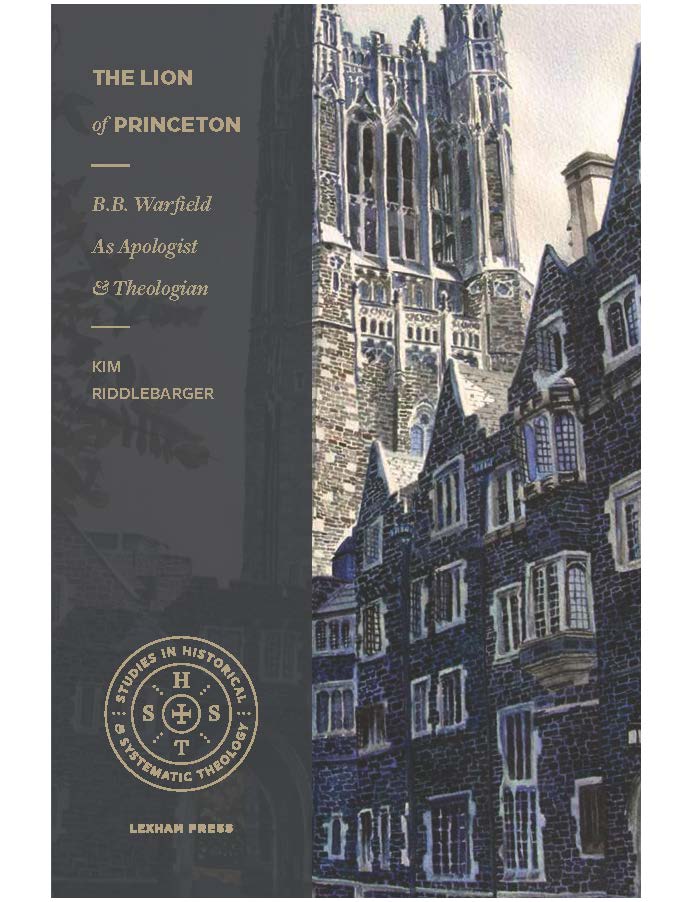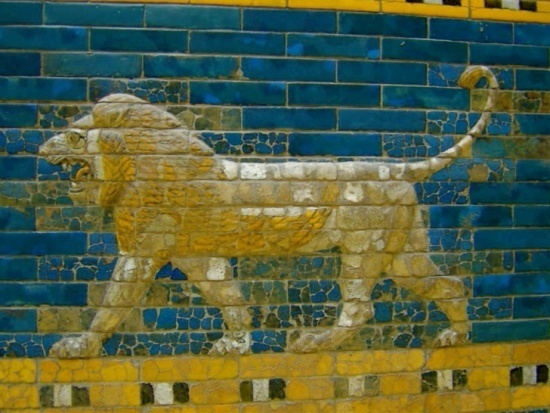"Got Me a Gator"
 Friday, June 16, 2017 at 11:51AM
Friday, June 16, 2017 at 11:51AM 
That is one big alligator--more than 15 feet with a huge head. It had been killing the rancher's cattle when they came to drink. That won't happen again.
 In The News
In The News
Living in Light of Two Ages
____________________________
 Friday, June 16, 2017 at 11:51AM
Friday, June 16, 2017 at 11:51AM 
That is one big alligator--more than 15 feet with a huge head. It had been killing the rancher's cattle when they came to drink. That won't happen again.
 Friday, June 16, 2017 at 11:13AM
Friday, June 16, 2017 at 11:13AM  Summer is often considered a great time to tackle a couple of good books. Let me heartily recommend that you add S. M. Baugh's new book, Majesty on High: Introduction to the Kingdom of God in the New Testament, to your list.
Summer is often considered a great time to tackle a couple of good books. Let me heartily recommend that you add S. M. Baugh's new book, Majesty on High: Introduction to the Kingdom of God in the New Testament, to your list.
Dr. Baugh was a classmate at Westminster Seminary California (class of 84). But don't let his antiquity negatively influence your decision.
This is a wonderful book--filled with great biblical insights and wisdom. Just what, exactly, is the relationship between the kingdom of God and the covenantal structure of Scripture? How does a proper understanding of the kingdom of God impact the way we see the relationship between the New and Old testaments.
This is great theology with a devotional warmth.
Here's a recommendation of the book from someone you might know.
"There has long been the need for a popular book on the Kingdom of God--one which draws upon current insights from biblical theology, and which addresses contemporary issues in eschatology, ethics, and covenant theology. S. M. Baugh has provided us with a wonderful book which does all of this. "The Majesty on High" achieves the rare feat of being readily accessible, while reflecting the scholarly wisdom gained from years of study and teaching New Testament. It even comes with study questions, and is suitable for both personal and group Bible study. Highly recommended!"
You can purchase Majesty on High here.
 Wednesday, June 14, 2017 at 02:01PM
Wednesday, June 14, 2017 at 02:01PM  My 2015 book on Princeton theologian B. B. Warfield, is being given a new cover by Lexham Press (the publisher).
My 2015 book on Princeton theologian B. B. Warfield, is being given a new cover by Lexham Press (the publisher).
The Lion of Princeton is part of Lexham's series in "Studies in Historical Theology & Systematic Theology."
You can read more about the Lion of Princeton here: The Lion of Princeton
 Wednesday, June 14, 2017 at 01:50PM
Wednesday, June 14, 2017 at 01:50PM 
The Twelfth in a Series of Sermons on the Book of Daniel
The sign on the door of the royal palace read “under new management.” The Persians (Medes) have displaced the Babylonians (Chaldeans) as the occupiers and rulers of Babylon. The Babylonian king, Belshazzar, is dead. Darius the Mede (Cyrus) is now in charge, ruling as Persian king over the former Babylonian empire. The Hebrew prophet, Daniel, now an old man, is immediately recognized by Darius as a wise and gifted man and an effective supervisor. Daniel is given great authority as one of three “presidents” (counselors) to supervise the satraps (or regional governors), who handled the day to day affairs of local government. It is a position of great honor, respect, and influence. But Daniel’s appointment to such high office creates much jealousy among the Persians, and even perhaps among former Babylonian officials who were passed over for the prestigious job which instead went to a despised Hebrew. A plot is soon hatched to remove Daniel from his new office, and it will not be long before Daniel finds himself forced to deny his faith in YHWH, or face being thrown to lions. But God preserves his people in such a way as to unmistakably reveal himself to be the sovereign Lord of all–even to the Persian king Darius.
The story of “Daniel in the lion’s den” is one of the best known and most loved of all the so-called “Bible stories.” This is a great story in its own right. But to make full sense as to why this incident is included in Daniel’s prophecy, it must be considered in light of the larger redemptive-historical context, which is the victory of YHWH, his prophets, and his exiled people over the false “gods” of Babylon, and now Persia. YHWH is sovereign over all kings and nations and is directing the events of which we have read throughout Daniel’s prophecy to his own ends. Daniel’s trial and ordeal in the lion’s den in chapter 6 are part of YHWH’s larger sovereign plan to ensure that the Jewish exiles in Babylon will be allowed to return home to rebuild the city of Jerusalem and YHWH’s temple. This comes about because YHWH moves Darius (Cyrus) to issue a decree to bring this to pass (recounted in the books of Ezra-Nehemiah). But the one incident which seems to truly motivate Darius to release the exile Jews is when the Persian king sees first hand the power of God in rescuing his prophet Daniel from a pride of hungry lions.
There are obvious similarities between this chapter and Daniel 3, when Daniel’s three Hebrew friends (exiles just as he was, Shadrach, Meshach, and Abednego) were cast into Nebuchadnezzar’s fiery furnace, only to be delivered by a mysterious fourth man–the angel of the Lord. God’s exile people often find themselves being persecuted by pagan officials because of their faith in YHWH. Faith in YHWH is seen as an offence against the pagan deities and those who worship them. In Daniel 3, it was the demand to worship Nebuchadnezzar’s gold statue, while in chapter 6 is it a demand to stop worshiping YHWH according to his word–and instead devote all prayers to the emperor Darius. Throughout most of church history these are pressures God’s people have faced–sometimes these pressures are subtle and easily avoided, while other times they are acute and a direct threat liberty and even life. The latter is the case in both Daniel 3 and 6. Once again, there are loud echoes from the Joseph story who was likewise thrown into a pit, rescued in an unexpected way, and yet prospered under the hand of God (Gen. 37:24; 39:23; 41:40).
To read the rest of this sermon: Click Here
 Monday, June 12, 2017 at 11:11AM
Monday, June 12, 2017 at 11:11AM 
Sunday Morning, June 18: In Galatians 6:1-10, Paul takes up the matter of reaping and sowing--so do we. Our worship service begins at 10:30 a.m.
Sunday Afternoon: Why is idolatry such a serious sin? We continue our study of the Heidelberg Catechism as we work our way through Lord's Day 34 (Q & A 92-95). Our catechism service begins @ 1:15 p.m.
Wednesday Night Bible Study: Will return in September.
The Academy: Resumes in the Fall of 2017.
For more information on Christ Reformed Church you can always find us here (Christ Reformed Info), or on Facebook (Christ Reformed on Facebook).
 Sunday, June 11, 2017 at 03:37PM
Sunday, June 11, 2017 at 03:37PM  The Search for a New Adam
The Search for a New Adam
As we saw in last week’s program, the Bible traces the story of God’s promise to rescue the world from the consequences of the Fall. Yet as we follow the lives of characters such as Abraham, Moses, and David, we find not only sinners but also those who sin in spectacular ways that remind us of Adam’s original sin. In other words, it quickly becomes clear in these stories that the new Adam has not yet arrived, and that the new creation is still on hold. On this program, the hosts continue to unpack this way of reading Scripture as they make their way through the Old Testament prophets and finally point to Jesus Christ as the true “Son of Man.”
 Thursday, June 8, 2017 at 03:50PM
Thursday, June 8, 2017 at 03:50PM Scary stuff.
Apparently, Bernie missed the fact that the U.S. Constitution forbides any religious test for holding public office (h.t. Justin Taylor).
I highly recommend David French's response, including a transcript (Sanders Imposes a Religious Test for Office)
 Wednesday, June 7, 2017 at 10:18AM
Wednesday, June 7, 2017 at 10:18AM 
The Eleventh in a Series of Sermons on the Book of Daniel
It was a party like no other. Wine was flowing freely and the thousand or so royal guests seem completely oblivious to the fact that within hours the party’s host (the Babylonian king Belshazzar) would be dead and the Persian army will have captured the city and the palace in which his guests were partying. King Belshazzar and the great Babylonian empire will be no more. Yet, the events of this fateful evening should not come as a surprise to Belshazzar. YHWH warned Belshazzar’s more famous predecessor (Nebuchadnezzar) of this very thing, in a dream recorded in Daniel 2. Nebuchadnezzar saw a gigantic metallic statue with a head of gold (presenting Nebuchadnezzar and his empire). But that empire would at some point give way to the Persian empire (represented by the silver arms and chest of the statue). It was the Hebrew prophet Daniel, who, when interpreting the dream, told Nebuchadnezzar of these events yet to transpire. On this very night, YHWH issues a warning of impending judgment–in the form of a mysterious handwritten message which suddenly appeared on the wall of the palace. Daniel is summoned to the king’s palace yet again. This time, Daniel is to interpret a mysterious handwritten message which absolutely terrified Belshazzar as well as his guests. The message does not bring good news to Belshazzar. It is YHWH’s declaration of judgment, fulfilling the scene in Nebuchadnezzar’s dream.
One of the sure signs that God is directing all things to his appointed ends is that the last night of the Babylonian empire is also the same night in which the intoxicated king ordered that the gold and silver vessels, originally taken as the spoils of war from the temple of YHWH in Jerusalem, be used at his party as vessels with which to toast the Babylonian gods of gold, silver, bronze, iron, wood and stone. These are the same elements which composed the statue of Nebuchadnezzaer’s dream, which was crushed by a rock cut without human hands (Christ’s kingdom), but which are worshiped by the Babylonian pagans. This is an act of out and out sacrilege by Belshazzar and nothing short of the intentional blasphemy of YHWH. We do not know if Belshazzar knew that this would be the night his empire would fall (there is no mention of him leading his troops or making an effort to rally Babylon’s defenders), but he does make an intentional effort to mock the God of Israel. But YHWH will not be mocked–especially by the likes of Belshazzar. So YHWH crashes the party by directing that an angel (or perhaps the pre-incarnate Jesus) write a message of warning on the wall of the royal palace for all to see, warning the king and his guests of sure and certain judgment coming later that evening.
While Belshazzar saw the hand of YHWH, his guests saw the writing. No one present could read it–certainly not the useless court magicians and wise men. Belshazzar was terribly shaken by the sight of the hand leaving the message. All color left his face, he looked faint and he was so shaken he could not walk. Overhearing the kerfulle in the palace, the queen mother entered the banquet hall and remembered a Hebrew prophet Daniel–who was now well up in years, and likely had not served in the royal court for some time. Daniel will be summoned to interpret the dream, only to warn Belshazzar that he will die this very evening. In this we see the overarching theme of the entire chapter–YHWH raises up kings and kingdoms. He removes kings when and how he wills. Belshazzar’s kingdom will be taken from him and then given to another. The point of this incident is to give encouragement to the Jewish exiles then living in Babylon. By the next morning, Darius the Mede (Cyrus) will be in charge, and he will issue his decree to allow the Jews to return home to Jerusalem to rebuild. This too, has been ordained by God.
To read the rest of this sermon: Click Here
 Monday, June 5, 2017 at 11:14AM
Monday, June 5, 2017 at 11:14AM 
Sunday Morning, June 11: We come to Galatians 5:16-26 and Paul's contrast between the works of the flesh and the fruit of the Spirit. Our worship service begins at 10:30 a.m.
Note: The Consistory has called a congregational meeting for Sunday, June 11 @ 9:00 a.m. in the fellowship hall.
Sunday Afternoon: How do I obey the first commandment? We continue our study of the Heidelberg Catechism as we come to Lord's Day 34 (Q & A 92-95). Our catechism service begins @ 1:15 p.m.
Wednesday Night Bible Study, June 7, (7:30 p.m.): We follow-up our series on personal evangelism by considering Jesus' view of the Bible and its authority.
The Academy: Resumes in the Fall of 2017.
For more information on Christ Reformed Church you can always find us here (Christ Reformed Info), or on Facebook (Christ Reformed on Facebook).